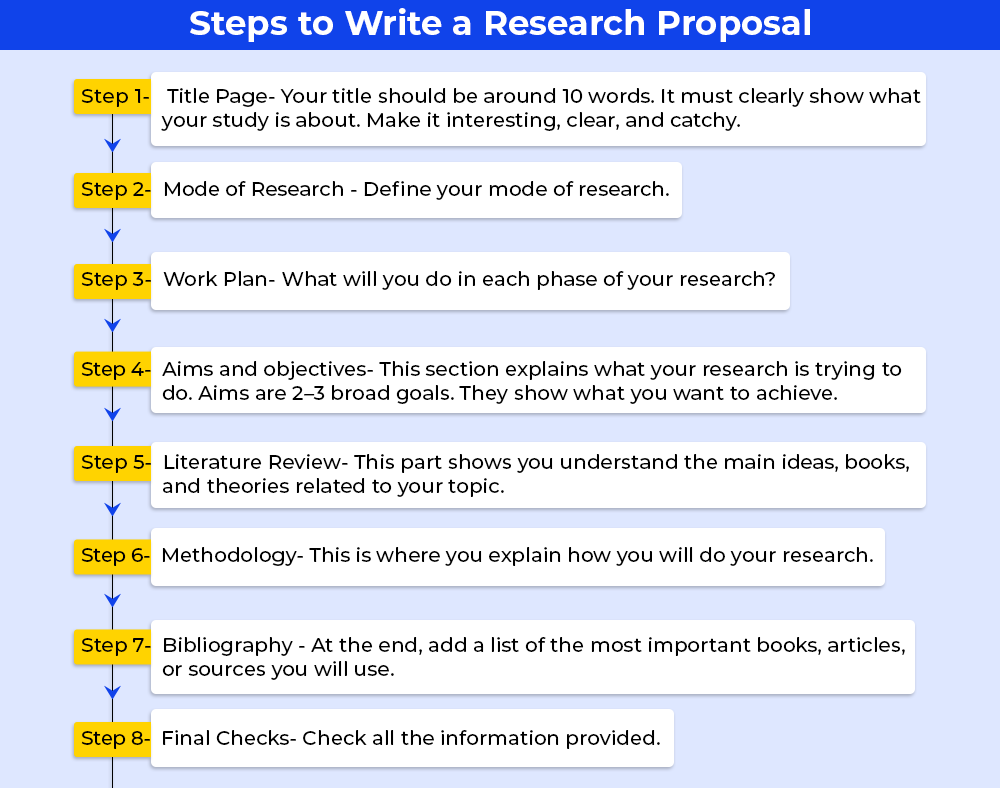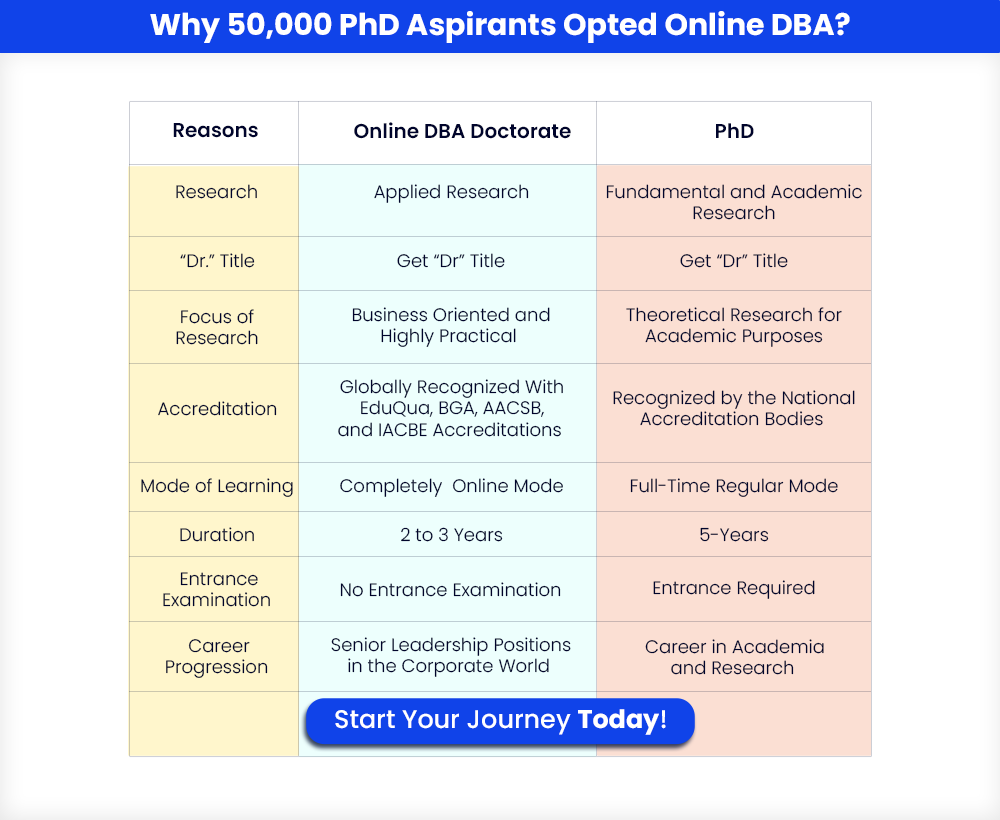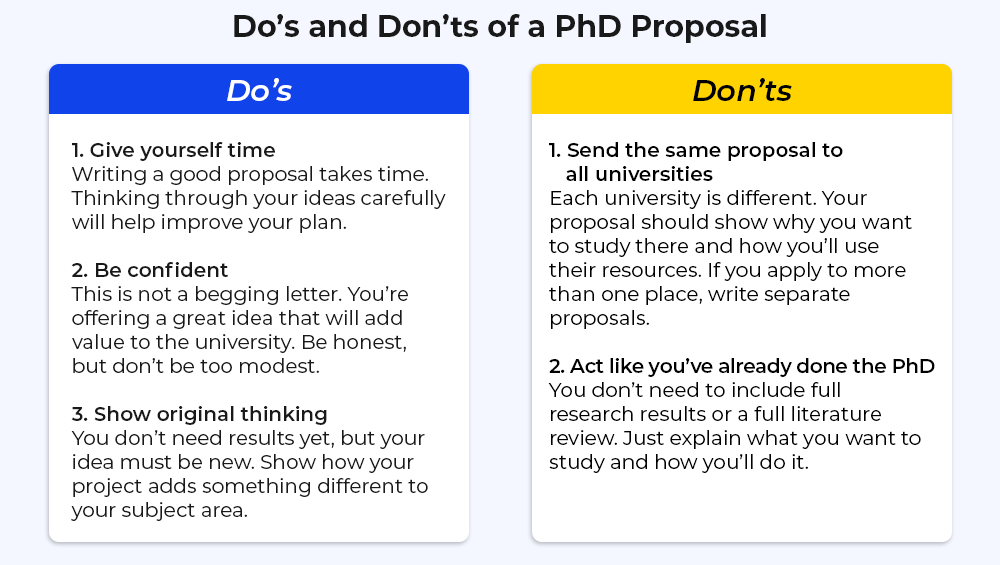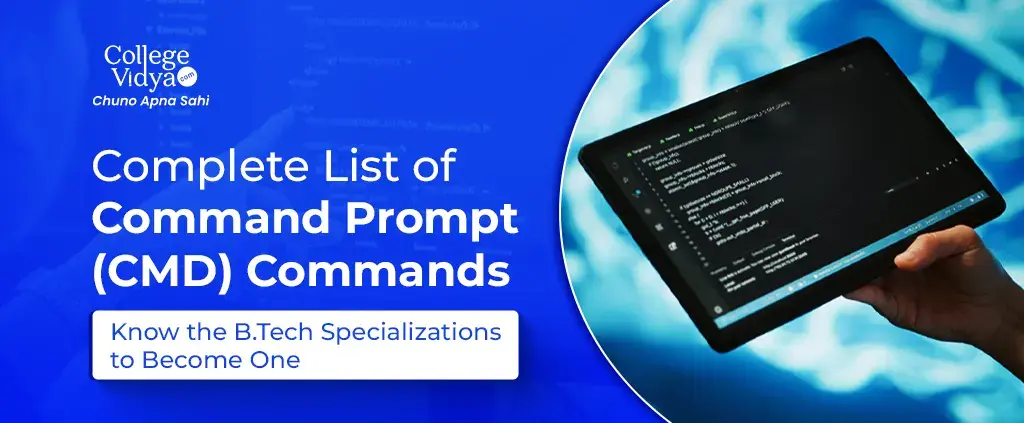Think of your PhD proposal like this: while the rest of your application shows that you can do a PhD, the proposal shows the exact PhD you want to do.
Being able to clearly plan and explain your research is a big part of doing a PhD well. That’s why the proposal is such an important part of your application.
The good news? Writing a strong proposal isn’t that hard. You just need to know three things:
- What the proposal is for,
- What it needs to do, and
- How to put it all together.
What is a Research Proposal in a PhD?
A PhD research proposal is an important document that explains what you want to research. Whether you need to write one depends on the type of PhD you're applying for.
If you’re applying for a PhD that is already planned by a university (often in science or technology), you probably don’t need a proposal. In that case, you just need to show you’re the right person for the project.
But if you’re coming up with your own research idea (this is common in subjects like Arts, Humanities, and Social Sciences), then you will need to write a proposal to explain your plan.
Some programs let you write your proposal after you start the PhD. This happens more in the USA and sometimes in the UK too. But in this guide, we’ll focus on how to write a good proposal as part of your PhD application.
Professor Leigh Wilson, who leads the graduate school at the University of Westminster, says that even though a research proposal is about work you haven’t done yet, supervisors and funding bodies also want to see what you’ve already done. This means you should show that you understand the books, research, and discussions that already exist in your field, especially the latest ones. You also need to clearly explain what’s missing from that research and how your work will add something new. Explaining this background is very important.
She also says it’s better to choose a small, clear topic instead of trying to cover a very big one. Even a long PhD thesis can only cover a small area properly. So go for deep and detailed research, not something too broad. The way you structure your proposal is also important. It should help you explain your plan clearly, but still allow room for changes as your PhD moves forward. Proposal formats can be different depending on the university, so it’s a good idea to check with your future PhD supervisor before you start writing. Keep these points in mind when preparing your research proposal.
But making a research proposal can be a daunting task. It is difficult, so many working professionals do not even try to pursue a PhD program, so if you are someone who is also afraid to do all of this, then you you can opt for an Online DBA, it is also a doctorate program and to apply for it, all you need is a master’s degree and even if you do not have master’s degree, you can still apply to an Online DBA. Still, you will need a working experience of 3-5 years along with a bachelor’s degree.
What Should a PhD Research Proposal Include?
It’s normal to feel nervous about writing a PhD proposal, especially if it’s your first time doing something like this.
But here’s the truth: a research proposal isn’t a hard test meant to stop you from doing a PhD. It’s actually quite simple.
A research proposal is just a document that shows three main things:
- Your PhD project is important
- Your project can be done in the time given
- You are the right person to do it at this university
In short: your idea matters, it’s doable, and you can do it.
1. Show That Your PhD Is Worthwhile (What and Why)
Your PhD project must be valuable and add something new to your field. It doesn’t have to be fully complete yet, but your proposal should show that your research can one day meet PhD standards.
Your topic should be original. That could mean:
- Studying something new
- Looking at old things in a new way
- Exploring new events or problems
Explain why your idea is interesting and how it can help others understand the subject better.
2. Show That Your PhD Is Doable (How)
You need to prove that your project can be finished in about 3 to 4 years. This might seem like a lot of time, but PhD students also do other things like teaching or attending events.
Explain what your project will cover and what it won’t. This keeps your topic focused and realistic.
Also, include a clear plan. Talk about:
- What steps you will take
- What methods you will use
- How you will collect and study data
- Any theories, tools, or travel you’ll need
Your plan doesn’t need to be perfect, but it should show that you’ve thought it through and it’s realistic.
3. Show That You Can Do It at This University (Who and Where)
You also need to show that you are the right person for this project, and this university is the right place for it.
Explain:
- What experience do you have (courses, previous projects, your Master's dissertation, etc)
- What skills do you have and what skills do you learn during the PhD
- Why did you choose this university
Talk about specific professors, labs, or resources that make this university a good fit for your project. This shows that your project and the university are a good match.
Why Is a Research Proposal Important?
It’s important because it gives a clear plan for your research. It shows:
- Your approach and methods
- Your timeline
- What you’ll need (resources, tools, budget, etc.)
It helps you and others understand your project clearly.
How Long Should It Be?
Usually about 2,000 words, but check the specific rules for your course or ask your supervisor.
Writing clearly and briefly shows that you can express your ideas well, something assessors look for in good researchers.
Structure of a PhD Proposal: How to Write a Research Proposal
The structure of your proposal doesn’t have to be scary. In fact, most research proposals follow a similar format.

Here’s a simple structure you can follow:
Title Page
Your title should be around 10 words. It must clearly show what your study is about. Make it interesting, clear, and catchy.
The title page should also include:
- Your full name
- Your academic title (like Mr., Ms., Dr., etc.)
- Your date of birth
- Your nationality
- Your contact details (email, phone, etc.)
Research Supervisor
Mention the name, department, and school of the supervisor who agreed to guide you. Don’t worry, they’ll help you shape your proposal as needed.
Mode of Research
Explain the style of your research. For example, will it be:
- Data-based?
- Fieldwork?
- Written work?
- Creative work (like media, performance, etc.)?
(Science students usually don’t need this part, but check with your supervisor.)
Synopsis
This is a short summary of your research.
It should clearly explain the what, why, and how of your project.
Tip: Ask someone to read just this part. If they understand your research idea, it’s written well!
Background
Here, explain why your research matters.
- Talk about past studies and research already done
- Mention well-known researchers and ideas in your field
- Explain what is missing in current research
- Show how your project adds something new
This helps show you understand the topic deeply.
Expected Research Contribution
Answer these questions:
- Why is your research idea worth exploring?
- What’s missing in current research?
- What will your study add to the field?
- Are you solving a problem, testing a theory, or challenging an idea?
Also, explain:
- How your project is original and important
- Why you chose this university and supervisor
- How your research fits with their work
Work Plan
This is your timeline. It shows you’ve thought about the time needed.
- What will you do in each phase of your research?
- PhDs or master’s by research take 2 to 4 years.
- Show detailed plans for year one, and a broader plan for the next years.
This part proves your research is possible and that you understand what it involves.
Resources
List the things you’ll need to complete your research, such as:
- Equipment
- Travel or fieldwork costs
- Budget or financial needs
This helps others see if your research is realistic.
Aims and Objectives
This section explains what your research is trying to do.
- Aims are 2–3 broad goals. They show what you want to achieve.
- Objectives are smaller, clear steps that show how you will reach your goals.
You also need to briefly explain:
- How your project fills a gap or adds something new to existing knowledge
- How your research connects to the department you are applying to
- Why your research is important—academically, socially, or politically
Literature Review
This part shows you understand the main ideas, books, and theories related to your topic.
- Mention the most important writers and ideas in your field
- Show that you know what has already been done
- Point out what is missing or what questions haven’t been answered
- Explain how your research will help fill these gaps
Methodology
This is where you explain how you will do your research.
- Show how you will answer your research questions
- If your topic includes collecting data, explain how you will do that (surveys, interviews, etc)
- If you are in the humanities, explain which texts or materials you will study
- Describe the people or group you will study, if any
- Talk about any limits your research might have
- Keep your project focused it’s better to study one small area well than to try to do too much
Timetable
After the methodology, you should add a timeline.
- Show how much time you will need for each part of your research
- You can use weekly or monthly time slots
- This shows that your project is realistic and that you have planned it well
Bibliography
At the end, add a list of the most important books, articles, or sources you will use.
- Only include the most useful and relevant ones\
- This shows that you can choose sources wisely
Final Checks
Before you submit your proposal, check these things:
- All pages are numbered
- The writing is neat, clear, and professional
- The content is interesting and makes sense
- It has been checked by:
- An expert (for academic quality)
- A friend or someone else (for spelling and grammar mistakes)
- You have a contents page
- The structure is simple and easy to follow
- You’ve used headings to organize your ideas
Some Samples of Research Proposals
You can check the link below to see the sample research paper for clarity of your thoughts-
- The Open University - Social Policy and Criminology
- Queen's University Belfast - Nursing and Midwifery
- University of Sheffield - Sociological Studies
- University of Sussex
- University of York - Politics
- York St John University
Get recognized with the “Dr” Title With A Much Easier Option
An Online DBA (Doctor of Business Administration) is a doctorate degree for working professionals who want to study more about business at a high level. It is different from a PhD because a DBA focuses more on real business problems and how to solve them, while a PhD is more about theory and research.
The Online DBA is made for people who already have a master’s degree. You do not need to leave your job, because the classes are fully online and flexible. You can learn from anywhere, at any time.
This program usually takes 3 to 5 years to complete. Some universities also offer fast-track options. In an Online DBA, you will study subjects like leadership, strategy, innovation, and business ethics. You will also do a research project to solve a real problem in your company or industry.
The biggest advantage of an Online DBA is that it helps you grow in your career. It is great for senior roles like CEO, Director, or Business Consultant. It also opens doors to teaching in colleges or working as a business researcher.
Many top universities in India and abroad offer Online DBA programs. These include the Swiss School of Business and Management, the European International University, and the Golden Gate University.
To join, you usually need:
- A master’s degree (MBA or similar)
- Work experience (2–5 years or more)
- A good research idea or interest area
An Online DBA is a smart choice if you want to become a business expert while continuing your job. It helps you grow your knowledge, build new skills, and stand out in the competitive business world. Check the table below to know the universities offering an Online DBA.
|
Universities |
Fees |
|
INR 6,00,000 |
|
|
INR 8,14,000 |
|
|
INR 8,12,500 |
|
|
INR 8,14,000 |
|
|
INR 5,50,000 |
|
|
INR 7,50,000 |
|
|
INR 7,00,000 |
Conclusion
Writing a PhD research proposal may seem difficult, but it’s just a clear plan of what you want to study, why it matters, and how you’ll do it. You must show that your research is new, possible, and a good match for the university. Keep your topic focused, use a simple structure, and explain each part clearly. A strong proposal proves that you are ready for a PhD. But if writing a proposal feels too much, you can consider an Online DBA. It’s also a doctorate, but easier to apply for, especially for working professionals.


















